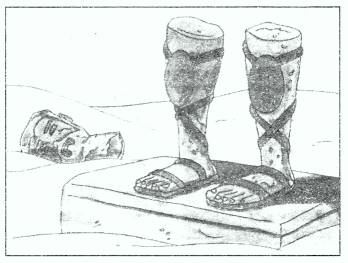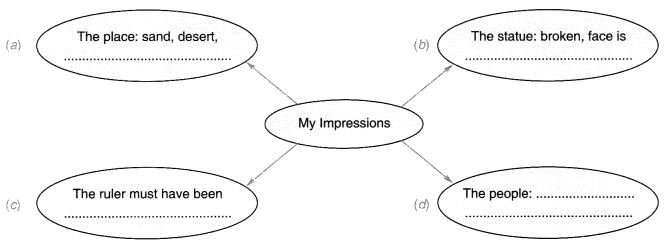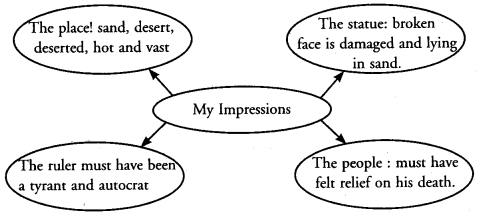Question 1.
Look at the picture given below :
While on a sight-seeing tour to an old and mysterious country far away from home, you saw this statue. Discuss with your partner what this picture tells you about the people, the place and the ruler. Note down your ideas in the web-chart.
Question 2.
Write a letter to your friend about the sight you saw and your impression of it.
Dear Ravi
How are you? Today I want to share an exciting experience with you. Recently we went on a tour of Gujarat to attend Rann Utsav. While exploring through the desert, we came across a ruined statue — probably constructed by a ruler to glorify himself. The statue was badly dilapidated and symbolized the end of political tyranny. The broken statue instantly impressed upon us the impermanence of power. Nothing is long-lasting and is sure to get destroyed with the passage of time. The kings statue which once, must be grand and dignified, now lay in ruin without attention and is much neglected.
Nobody seems to case for the statue that shows its fall from grace and an emptiness around it. It is true that nobody can beat time and only good deeds of a person remain long after he has died. Yours lovingly Shobhit.
Question 3.
Answer the following questions by ticking the correct options.
(a) The poem is set in _________
(i) the wilderness
(ii) an ancient land
(iii) a pulace
(iv) a desert.
(b) The expression on the fiwe of the statue is one of _________
(i) admiration
(ii) anger
(iii) despair
(iv) contempt
(c) This poem throws light on the _________ nature of OzymandLas.
(i) cruel
(ii) arrogant
(iii) boastful
(iv) aggressive
(c) This poem throws light on the _________ nature of OzymandLas.
(i) cruel
(ii) arrogant
(iii) boastful
(iv) aggressive
(e) The tone of the poem is _________
(i) mocking
(ii) nostalgic
(iii) gloomy
(iv)gloating
(a) (ii) an ancient land.
(b) (iv) contempt
(c) (ii) arrogant
(d) (ii) expression
(e) (i) mocking
Question 4.
Answer the following questions briefly:
(a) “The hand that mocked them, and the heart that fed.” Whose hand and heart has the poet referred to in this line?
(b) “My name is Ozymandias, king of kings Why does Ozymandias refer to himself as King of Kings ? What quality of the king is revealed through this statement?
(c) “Look on my works, ye Mighty, and despair !” Who is Ozymandias referring to when . he speaks of ye Mighty? Why should they despair?
(d) Bring out the irony in the poem.
(e) ‘Nothing beside remains’. What does the narrator mean when he says these words?
(f) What is your impression of Ozymandias as a king?
(g) What message is conveyed through this poem?
(a) The hand and heart of king Ozymandias has been referred to by the poet in this line. Though he was a cruel and wicked king, he took great care of his people.
(b) Ozymandias was proud of himself. He boasted about his greatness. The lines show that he was an arrogant king and thought himself to be the greatest among all kings.
(c) Ozymandias is referring to Fits works. He boasts that his works are so magnificent that people can only admire them. Despair here means give up. They should despair whenever they try to imitate or surpass his work.
(d) In Percy Bysshe Shelleys poem Ozymandias, there is an overriding irony presented to show the difference between the sculptor and the sculpture.
The poem’s irony revolves around Ozymandias himself. The great irony here was having the pharaoh narrate the poem, boasting of all his greatness and power, yet all that he has ‘established’ now lies in ruins, crumbling through time, slowly joining the surrounding sands.
Ozymandias was so full of authority, even though there was nothing left of what he boasts. His kingdom and his glory now lie in the sands with only stone slabs.
(e) These words mean that even the greatest are destroyed. Now nothing else remains except the stones.
(f) Ozymandias was an arrogant and wicked king. He was proud of himself but he took care of his people. He wanted the people to see his works and praise him. He thought himself to be greater than any other king.
(g) The poem conveys an important message that nothing lasts forever. Even the greatest kingdoms and political regimes are sure to crumble so one should never be proud of even the greatest fall one day or the other. So one should not be proud of oneself.
Question 5.
Identify and rewrite the lines from the poem spoken by the narrator, the traveller and Ozymandias:
The Narrator: I met a traveller from an antique land.
The Traveller: Two vast and trunkless legs of stone.
Stand in the desert. Near them, on the sand,
Half sunk, a shattered visage lies, who frown,
And wrinkled lips and sneer of cold command,
Tell that its sculptor well those passions read Ozymandias: “My name is Ozymandias, king of kings:
Question 6.
Shelley’s sonnet follows the traditional structure of the fourteen-line Italian sonnet, featuring an opening octave, or set of eight lines, that presents a conflict or dilemma, followed by a sestet, or set of six lines, that offers some resolution or commentary upon the proposition introduced in the octave. Read the poem carefully and complete the following table on the structure of the poem.
| Rhyme scheme | Theme | |
| Octave | ||
| Sestet |
| Rhyme scheme | Theme | |
| Octave | ab, ab, ac, dc | The statue of Ozymandias is described. |
| Sestet | ab, ac, ac | The boastful and arrogant words are as empty as the bare and boastful sand and that man is Insignificant before the supremacy of time and nature. |
The poem, as an Italian sonnet, can be divided into two parts: the first eight lines (octave) and the next six lines (sestet). If the octave part describes the fragments of a sculpture the traveller sees on an ancient ruin, the sestet goes further to record the words on the pedestal and then describe the surrounding emptiness. The words on the pedestal are in contrast to both the octave and the last three lines (triplet) of the poem.
Question 7.
Complete the table listing the poetic devices used by Shelley in Ozymandias.
| Poetic Device | Lines from the poem |
| Alliteration | … and sneer of cold command |
| Synecdoche (substitution of a part to stand for the whole, or the whole to stand for a part) | the hand that mock’d them |
Alliteration
Repetition of a initial sound
Two vast and trunkless legs …
cold command,
The hand that mocked them and the heart that fed;
boundless and bare
lone and level sands stretch …………
Anastrophe
Inversion of the normal word order
… well those passions read (normally, read those passions well)
Enjambement (also spelled without the first e)
Carrying the sense of one line of verse over to the next line without a pause
… a shattered visage lies, whose frown,
And wrinkled lip, and sneer of cold command,
“Whose frown, And wrinkled lip is the enjambement.
Nothing beside remains. Round the decay
Of that colossal wreck, boundless and bare
‘round the decay begins the enjambement.
Synecdoche
Substitution of a part to stand for the whole, or the whole to stand for a part
The hand that mocked them,
Question 8.
Imagine that Ozymandias comes back to life and as he sees the condition of his statue, realisation dawns on him and he pens his thoughts in a diary. As Ozymandias, make this diary entry in about 150 words. You could begin like this: I thought I was the mightiest of all but…
I thought I was the mightiest of all but I feel sad to see the condition of my statue, lying in dust It grieves me to see the statue broken and the head cut off from the body. The face is half sunken in the sand. Around it nothing can be seen except vast stretches of bare sand. No one is there to admire and praise it. I once thought myself to be the greatest ruler and the people honoured me. The people should look at it and should know that nothing can be changed. The sculptors who had noted my expressions in my statue cannot make r.ight what has been destroyed. It teaches me a lesson that everything comes to an end and nothing remains forever. So one should not be proud of oneself.
Question 9.
‘Ozymandias’ and ‘Not Marble, nor the Gilded Monuments’ are on Time. Compare the two sonnets in terms of the way in which Time is treated by the poets. Write your answer in about 150 words.
Shakespeare in his sonnet ‘Not Marble, nor the Gilded Monuments’ written on time expresses that monuments are made for the wealthy to keep the memory of someone alive. Stone can be altered by the immortalities of time.
This poem will leave behind the material things of life but his poem shall survive longer than any gold plated monument. It will be portrayed for all time and his subject will shine when devastating wars of time shall overturn statues. The cause of war (Mars) nor the effects of war (fire) shall destroy the loving memory.
In ‘Ozymandias’ the poet has treated time in a different manner. He says with the passage of time everything is destroyed, be it king, property or monument. The king who was so terrified and those who commanded no longer have any power. Poet comments on temporal nature of the things humans strive for but with time everything vanishes. Ozymandias’ empire ceased to exist. His statue will also expire. Only sand will remain.
